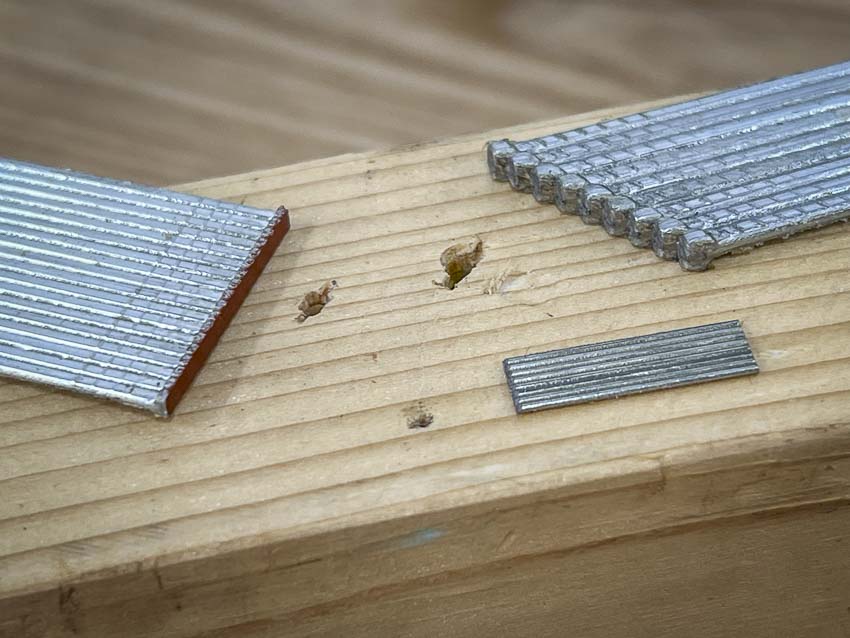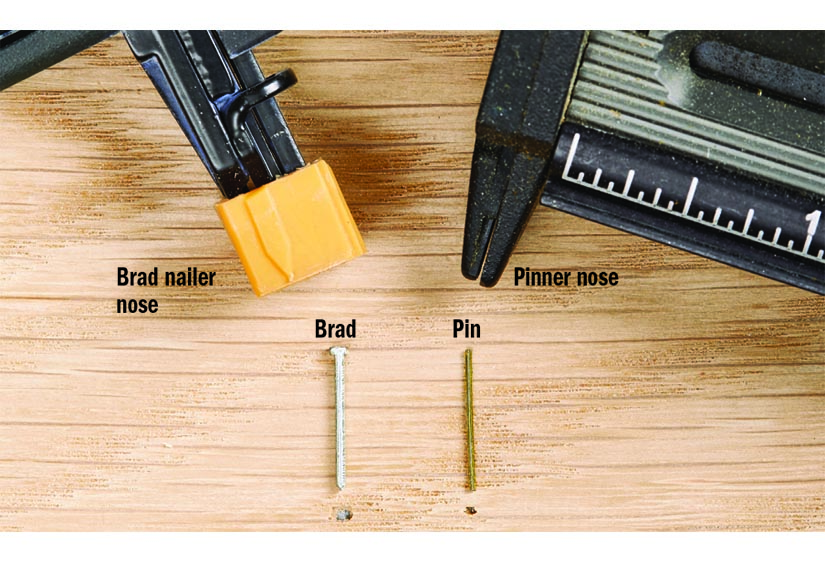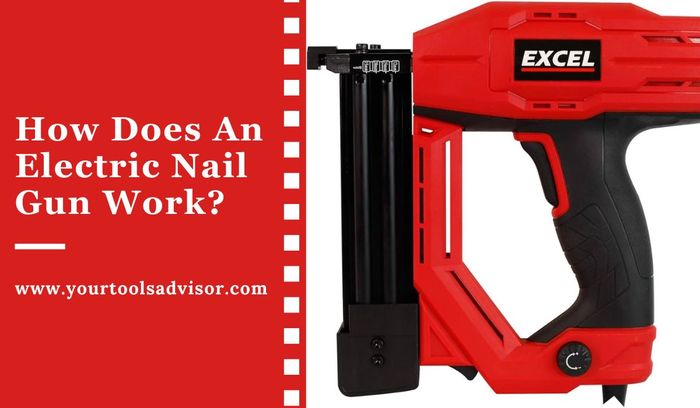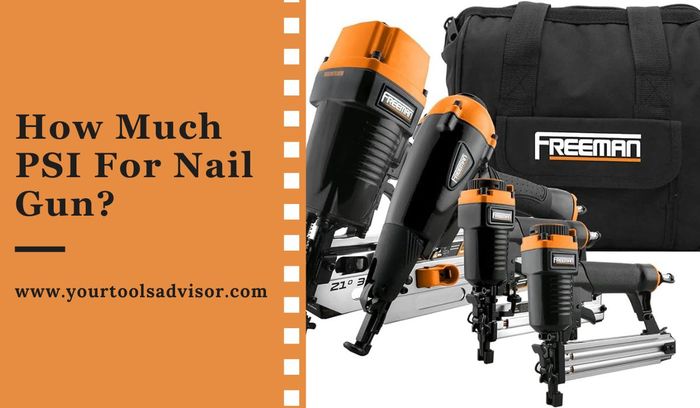A pin nailer is used for delicate woodworking, a brad nailer is ideal for trim and light construction, while a finish nailer is perfect for larger moldings and heavier materials. These three types of nailers each serve different purposes in various applications.
Pin nailers are great for holding pieces together temporarily, brad nailers are useful for attaching trim and small moldings, and finish nailers are perfect for securing heavier molding and construction materials. Each nailer has its advantages and should be chosen based on the specific project requirements.
So, whether you’re working on delicate woodworking, trim installation, or heavy-duty construction, choosing the right nailer is crucial for achieving professional and long-lasting results.

Credit: www.protoolreviews.com
Pros And Cons Of Pin Nailers
Pin nailers, brad nailers, and finish nailers each have their pros and cons. While pin nailers offer minimal damage and discreet fastening, brad nailers provide stronger hold and versatility. Finish nailers, on the other hand, offer a stronger bond and are suitable for larger projects.
Choose the right nailer based on your specific needs and project requirements.
|
Benefits And Drawbacks Of Brad Nailers
When choosing a nail gun, it’s important to consider the specific needs of your project. Brad nailers are an excellent choice due to their versatility for a wide range of applications. They can handle larger nail sizes, providing increased holding power for projects that require extra strength. Moreover, brad nailers leave smaller holes compared to finish nailers, resulting in less noticeable and easier-to-fill blemishes. However, it’s worth noting that brad nailers may not be suitable for heavy-duty construction. If you’re working on projects that require substantial durability and holding strength, another type of nailer might be a better option. It’s essential to evaluate the specific requirements of your project and choose the nailer accordingly.
Examining The Advantages And Limitations Of Finish Nailers
Finish nailers offer several advantages over pin nailers and brad nailers, such as their ability to provide a stronger hold and support larger nails. However, they also have limitations, such as being less maneuverable in tight spaces and leaving larger holes.
Ultimately, the choice between these nailers depends on the specific project requirements and personal preferences.
- Finish nailers are a popular choice for various projects due to their superior holding power. They offer strong and reliable connections, making them suitable for both trim work and heavy-duty applications.
- One limitation of finish nailers is that they leave larger holes compared to other types of nailers, which may require additional touch-up work to conceal.
- Finish nailers typically use 15-gauge or 16-gauge nails, providing a good balance between strength and versatility.
Project Type And Scale
When deciding between a pin nailer, brad nailer, or finish nailer for your woodworking projects, it’s important to consider the project type and scale.
For precision and detailed work such as trim installation or delicate cabinetry, a pin nailer is often the best choice. Its smaller 23- or 21-gauge pins leave minimal visible holes, allowing for seamless finishing.
For medium-scale projects like furniture assembly or crown molding, a brad nailer provides versatility and reliability. With its 18-gauge nails, it offers a balance between strength and visibility.
On the other hand, heavy-duty construction projects including framing or attaching large boards require the power and strength of a finish nailer. Equipped with 15- or 16-gauge nails, it ensures a secure hold and stability.
Keep in mind that the right nailer for your project can depend on various factors, such as the material being used and the desired level of finishing. Assess your specific needs and choose the appropriate nailer to achieve the best results.
Nail Holding Power Requirements
Pin nailers, brad nailers, and finish nailers are all versatile tools with different strengths in nail holding power.
For lightweight and delicate materials such as trim work, pin nailers could be an ideal choice. They leave tiny holes that are easily fillable, minimizing the need for excessive touch-up work.
Brad nailers offer greater holding power, making them suitable for medium-density materials like crown molding or cabinets. The larger gauge nails provide a secure hold without risking damage to the workpiece.
When it comes to heavy-duty projects, a finish nailer is the preferred option. The larger nails it uses provide the utmost holding power, making it perfect for jobs like framing or attaching baseboards securely.
Time And Efficiency
When considering time and efficiency in your projects, choosing the right nailer is essential. A pin nailer, brad nailer, or finish nailer each offer their own advantages depending on the task at hand.
For quick and easy setup, a pin nailer is the way to go. With its small and delicate pins, it allows for minimal visible holes, creating a seamless and concealed finish. This makes it perfect for delicate trim work and crafts.
When it comes to rigorous or time-sensitive projects, a brad nailer is your best bet. It provides more holding power than a pin nailer, while still leaving smaller, less noticeable holes than a finish nailer. This makes it suitable for installing trim, cabinets, and other similar applications.
However, if you’re looking for maximum holding power and durability, a finish nailer is the way to go. It uses larger and stronger nails, providing a robust hold for heavy-duty projects like building furniture or installing hardwood flooring.
Choosing The Right Nailer Based On Project Requirements
A pin nailer, brad nailer, and finish nailer are all essential tools for carpentry and woodworking projects. Each type of nailer has its own strengths and is best suited for specific project requirements.
A pin nailer is ideal for delicate and intricate work. It is designed to leave behind tiny holes that can easily be filled, making it suitable for projects such as furniture assembly and trim work.
A brad nailer offers versatility and is perfect for medium-scale projects. It can handle a variety of materials and is commonly used for crown molding, baseboards, and other general woodworking tasks.
For heavy-duty construction and trim work, a finish nailer is the go-to tool. It uses larger nails and provides a stronger hold, making it perfect for tasks such as attaching baseboards, installing cabinets, or building furniture.
When choosing the right nailer, consider the specific requirements of your project. Evaluate the level of delicacy, versatility, or strength needed, and select the appropriate nailer accordingly. Each of these nailers has its own unique role in achieving professional and durable results.
Considerations For Budget And Nail Compatibility
Pin nailers, brad nailers, and finish nailers each have their own unique features and applications. When considering your budget and nail compatibility, it’s important to keep a few things in mind.
Pin nailers tend to be more affordable compared to brad and finish nailers. They are great for delicate trim work and securing lightweight materials. However, they have limited holding power and are not suitable for heavy-duty projects.
Brad nailers offer a balance between cost and performance. They are slightly more expensive than pin nailers but provide better holding power. Brad nails are ideal for trim work, molding, and attaching thin or medium materials.
Finish nailers are typically pricier but offer outstanding holding power. They are the go-to option for heavy-duty applications, such as attaching baseboards, crown molding, and cabinetry. Finish nails provide excellent strength and are less likely to split wood.
Examining User Experience And Recommendations
Pin Nailer Vs Brad Nailer Vs Finish Nailer
Insights From Professional Carpenters And Diy Enthusiasts
| Criteria | Pin Nailer | Brad Nailer | Finish Nailer |
|---|---|---|---|
| Application | Suitable for delicate trim work, paneling, and light moldings | Ideal for cabinetry, trim, and light woodworking projects | Designed for heavier trim, crown molding, baseboards, and larger woodwork projects |
| Nail Size | Uses 23-gauge pin nails | Uses 18-gauge brad nails | Uses 15 or 16-gauge finish nails |
| Strength | Provides strong hold but with minimal visibility | Offers stronger holding power with slightly more visible nail heads | Delivers the strongest hold and nail heads are more visible |
| Versatility | Less versatile, limited to delicate trim and molding work | Moderate versatility, suitable for various woodworking tasks | Highly versatile, can handle a wide range of woodworking projects |
When deciding which nailer to use, it’s important to consider the specific requirements of your project. Pin nailers are more suited for delicate trim work and light moldings, whereas brad nailers are ideal for cabinetry, trim, and light woodworking projects. Finish nailers, on the other hand, are designed for heavier trim, crown molding, baseboards, and larger woodwork projects. The choice of nail size also differs among the three types, with pin nailers using 23-gauge pins, brad nailers using 18-gauge brads, and finish nailers using 15 or 16-gauge finish nails. It’s important to note that while pin nailers provide a strong hold with minimal visibility, brad and finish nailers offer stronger holding power with slightly more visible nail heads. Overall, the versatility of the nailers also varies, with pin nailers being less versatile and finish nailers being highly versatile for a wide range of woodworking tasks.
It’s common for DIY enthusiasts and carpenters to have concerns and misconceptions regarding the choice of nailers. Some may believe that brad nailers can replace finish nailers entirely, but this isn’t always the case as finish nailers are better suited for heavier trim and larger projects. Additionally, there may be misconceptions around the ideal nail size for specific applications. This comparison table and the insights from professionals can help address these concerns and guide you in selecting the most suitable nailer for your specific project needs.
Frequently Asked Questions For Pin Nailer Vs Brad Nailer Vs Finish Nailer
Is A Pin Nailer The Same As A Finishing Nailer?
No, a pin nailer is not the same as a finishing nailer. They are two different types of nail guns used for different purposes. A pin nailer is used for delicate trim work and uses small-gauge pins, while a finishing nailer is used for heavier trim and uses larger-gauge nails.
What Is The Difference Between A Brad Vs Finishing Vs Pin Nailer?
A brad nailer is used for light woodworking, a finishing nailer for general woodworking, and a pin nailer for delicate work.
Is A Pin Nailer Or Brad Nailer Better For Baseboards?
A brad nailer is better for baseboards as it provides stronger hold, while a pin nailer is suitable for delicate trim work. Choose according to the project requirements.
What Would You Use A Pin Nailer For?
A pin nailer is used for joining thin pieces of wood together. It’s great for small projects like trim work, cabinet assembly, and delicate woodworking. The nails it uses are small and leave barely visible holes. It’s easy to handle and provides a secure and clean finish.
Conclusion
To sum up, the debate between pin nailers, brad nailers, and finish nailers can leave you feeling puzzled, but understanding the purpose of each tool is crucial. Pin nailers excel in delicate and intricate work, while brad nailers provide versatility for various woodworking projects.
Finish nailers, on the other hand, are ideal for heavy-duty applications. By evaluating your needs and project requirements, you can make an informed decision and choose the right tool that suits your specific woodworking needs. Happy nailing!





Leave a Reply